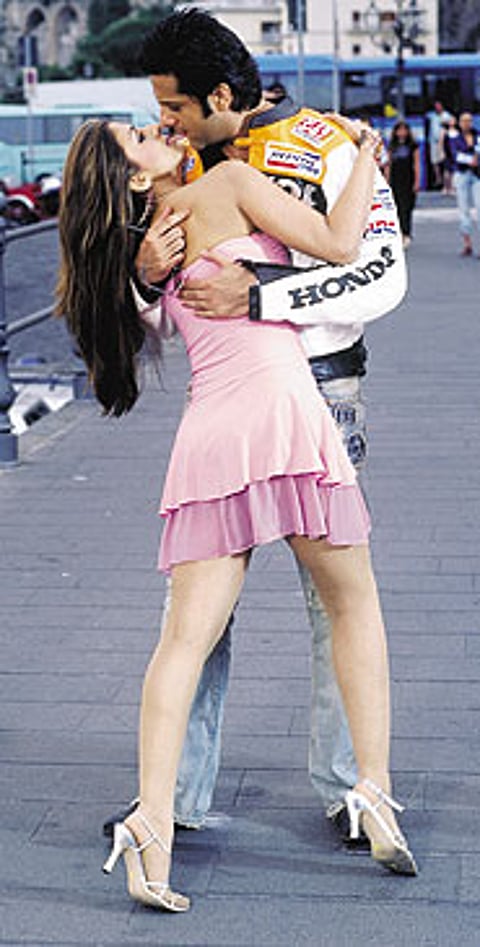Bawdylicious
Love them or leave them, but Bollywood comedies are going raunchy with a vengeance, overreaching the limits of decorous language and sexuality, and selling the better for it


What's working is a potpourri of the following elements: infidelity, men (usually three) chasing skirts and bonding together, women who give the word dumb a whole new meaning and oodles of salacious lines. The primary audience is presumably the youth, hence the colourful and brash lingo. Youngsters don't spout poetry in real life. So, the guy in Kyaa Kool proposes with the one-liner: "Kya tum mera time-pass banogi?" In Shaadi No. 1, even as the guys chase the gals, the background score goes: "Phatnewali hai... phatnewali hai..."
So what's new? It's not as though raunchy comedies have not been part of our cinema. But unlike B.R. Chopra's Pati, Patni Aur Woh or Basu Chatterjee's Shaukeen, films now are far more in-your-face and blase. There have been regional examples of raunchiness, with Dada Kondke leading the pack, but now the crude has gone hip and mainstream. "There's a strong constituency of people that's not afraid to watch them any more. These films are no longer confined to B or C-grade cinema halls, but run in fancy multiplexes," says Shohini Ghosh who teaches at the AJK Mass Communication Research Centre, Jamia Millia Islamia.
Kyaa Kool... may have been a peer group, stag party film, but No Entry was patronised by wholesome families as well. Why, the jokes were not lost on innocent kids either. "We thought parents may not want their kids to watch No Entry, Maine Pyaar... but everyone has been flocking in. It's as though a barrier has broken down," says Rahul Sharma, manager, operations, JAM multiplex in Ghaziabad.

It's not as though eyebrows aren't being raised about the low-brow jokes or the offensive, dumbed-down humour. But the creators don't care. "Let the guardians of morality say what they want to, the common man is enjoying them," says screen-writer Milap Zaveri, dialogue writer for Masti and now Shaadi No. 1. "It is wrong to club comedies into various grades. A comedy works so long as it makes you laugh," says filmmaker Sujoy Ghose of Jhankaar Beats fame, whose fun-filled new film, Home Delivery, promises to buck the trend with some sophisticated smiles.
Perhaps it's the times that are a'changing. In the age of TV scandals, crude SMS jokes and MMS exposes, why not a raunchy flick? "Old-fashioned romance doesn't work any more. Girls like naughty, flirtatious guys. No one wants a simpleton for boyfriend. That's what we're showing," says Jain. The globalised youth is more confident and independent, which reflects in their attitude and lingo. "Nothing's taboo, kids are more outspoken, use a broader language which shows up in films too," says Sujoy. "The youth today has a comfort with sex and sexuality," says Shohini. Ditto the films.
Masti and Kyaa Kool... are now subjects of a new academic study as well. In an essay in a forthcoming Seagull anthology, 'False appearances and mistakes in identity: the erotic and the phobic in Bombay cinema's queer vision', Shohini talks about how transgendered people are getting acknowledged in these films. "It's uncomfortable and ambiguous. You're never sure whether they're accepting homosexuality or hailing homophobia. But it's an interesting rupture within the largely heterosexual frame of our mainstream films," she says.
What next then? Part 2 of Kyaa Kool... and No Entry; Awara Hue Paagal, based on the scatological Hollywood comedy, There's Something About Mary. Even the new Yash Chopra film Neil'n'Nikki promises to be utterly bold, about a guy getting married in 21 days' time, and wanting to make out with a new girl every night till the D-day. The fun begins when he is unable to do it. Clearly the ribald is set to get ribalder, sleaze will sell and juvenile minds will go nudge nudge, wink wink for some more time. After all, in Bollywood it's good to be bad these days.
Tags